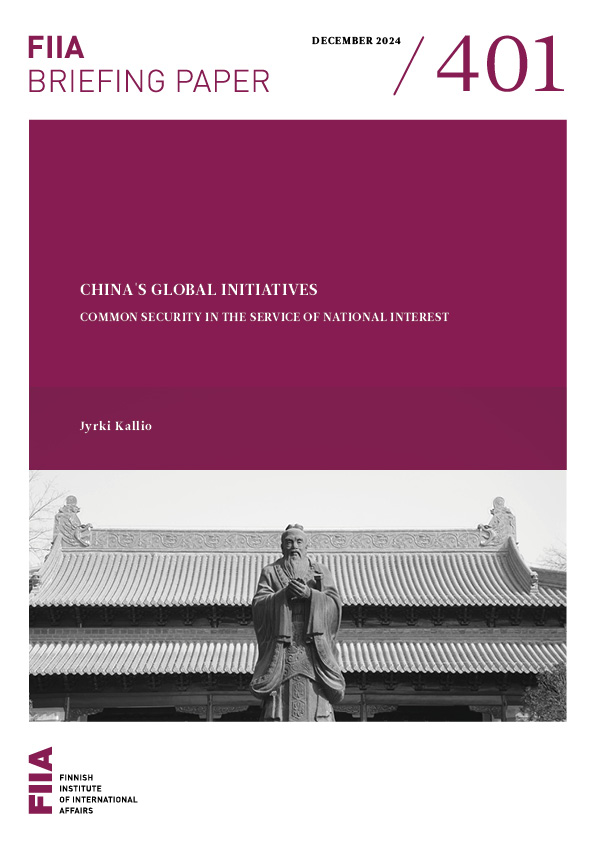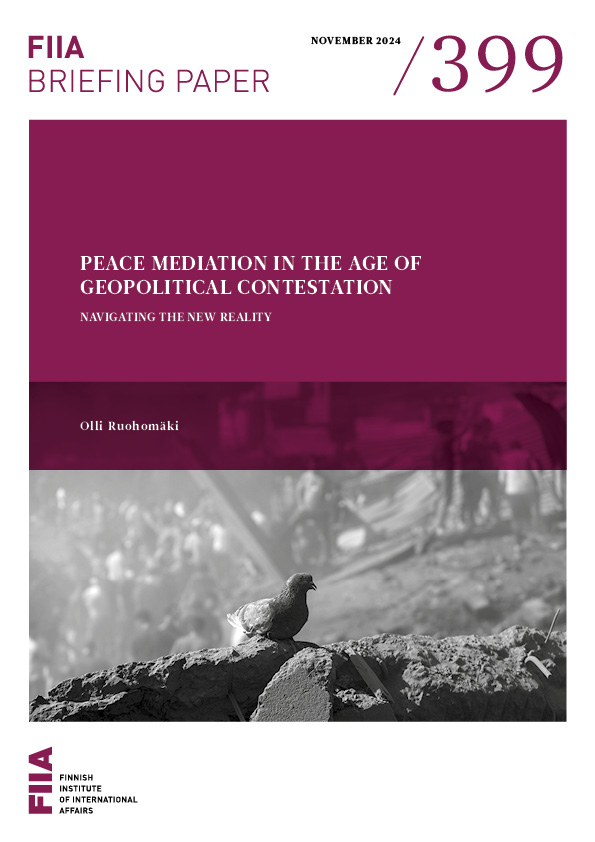It is a feat of Finnish diplomacy to have Helsinki included in President Xi’s itinerary. The decision may be thanks to Finland’s half-way position between Asia and America, and the country’s good relations with China and the USA. Finland’s centenary celebrations will endow the visit with extra pomp and media visibility.
China’s Communist Party Leader and President, Xi Jinping, is making a state visit to Finland on 5-6 April, 2017. He is scheduled to meet with both the President of the Republic, Sauli Niinistö, the Speaker of the Parliament, Maria Lohela, and the Prime Minister, Juha Sipilä. The significance of the visit stems from the fact that no Chinese head of state has visited Finland since 1995, and Mr Xi has not visited any other Nordic country as President. He visited Finland and Sweden in 2010, then as Vice-President and, among other dignitaries, also met the Finnish Santa Claus. It is a feat of Finnish diplomacy to have Finland included in President Xi’s busy itinerary. It is likely that Xi chose to agree to come to Finland due to the centenary of Finland’s independence celebrated this year, which endows both the visit and Xi himself with extra media attention.
President Xi will continue from Helsinki to Florida for his first meeting with the newly inaugurated President Donald Trump. While the discussions in Helsinki are likely to focus on the bilateral relations between Finland and China, the European Union and Russia will surely figure among the topics. For China, Finland is of interest as an EU member state with a long history as Russia’s neighbour. The future of European integration and EU-Russia relations will have a significant impact on the world economy, and hence on China, too. For his part, Xi may be expected to expound China’s views of the international system, and the expectations China harbours for the future of international relations.
The main focus in the bilateral relations will probably be the establishment of a partnership. The partnership document has been under preparation for some time, the signing of which has been on hold until the first suitable high-level visit. China has different partnership agreements with many countries. For example, Denmark and China have established a “comprehensive strategic partnership”, and the EU and China are “strategic partners”. The Finnish approach to the negotiations has been highly pragmatic, and it has not been deemed necessary for the Sino-Finnish partnership to follow the model of any previous partnership. The new Sino-Finnish partnership has been unofficially dubbed “a new type of partnership”, and instead of an agreement, it will be launched with a joint declaration.
The visit may also be used to celebrate the opening of the China Cultural Centre in Finland. Such cultural centres are an undertaking by the Chinese Ministry of Culture, and they compete in the dissemination of China’s soft power with the Confucius Institutes, administered by the Ministry of Education. China has already set up cultural centres in Copenhagen and Stockholm, among other capitals. There has been a Confucius Institute in Helsinki since 2007. It is nevertheless uncertain as to whether the talks between the Finnish and Chinese parties have reached a point as yet which would allow for the opening of the centre to coincide with Xi’s visit. Chinese soft power is also expected to descend on Finland in the form of cuddly pandas. The delivery of several giant pandas to Ähtäri Zoo has been under negotiation, and it is hoped that Xi will confirm their arrival.
For Finnish businesses, Xi’s visit is highly anticipated, even though he is not travelling with a large business delegation, due to the short stay. The interest among Chinese companies to invest in Finland has risen remarkably over the last year or two, and Xi’s visit may be expected to give a boost to the preparation of some projects currently under consideration. China’s business interests in Finland include, in particular, environmental technologies, biofuel, nanotechnology, and Arctic know-how. Due to the upcoming Winter Olympics, China is also interested in Finnish expertise in winter sports.
One noteworthy aspect of Sino-Finnish relations is the judicial cooperation that already has a decades-long history. In practice, this has taken the form of the training, for example, of Chinese judges, attorneys, prosecutors, and prison administrators. When it comes to EU member states, Finland may not be among the most vocal critics of China’s human rights situation, at least in public. Instead, it is said that Finland focuses on working behind the scenes, particularly through the judicial cooperation. During Xi’s era, the room for manoeuvre within China’s civil society has shrunk drastically. The arbitrary detention of lawyers who have defended civil society activists has prompted grave concern among China watchers. Seven EU member states’ embassies in Beijing, including those of Sweden and Estonia, have jointly called on China to end the harassment of lawyers. As a consequence, Finnish state leaders face strong pressures to take up human rights issues with China in stronger tones than previously. They are, nevertheless, unlikely to do so during Xi’s visit, as the goal is probably to make the visit as solemn and ceremonial as possible, as befits the centenary year celebrations.
What signal is China sending by virtue of choosing Finland as the stop-over destination for Xi on his way to the USA? For Xi, Finland provides a soft landing to the States. After all, Finland is a Western country that has amicable relations with both China and the US. There is probably no particular symbolism attached to the visit, although some observers may be reminded of the Cold War era between the USA and the Soviet Union. While Sino-US relations are currently not the most amicable due to Trump’s rhetoric during his campaign, it is unlikely that Xi chose to visit Finland in the hope of benefitting from the “Helsinki Spirit”. Finland hardly has a role to play as an intermediary in the disputes between China and the US. Xi’s visit can more plausibly be explained by a general willingness to pay a visit to a country which holds less than a central position in China’s foreign policy priorities as long as the set-up offers enough pomp. For Finland, Xi’s visit nevertheless has great significance, and Xi is without doubt among the most prominent visitors during the centennial year.






